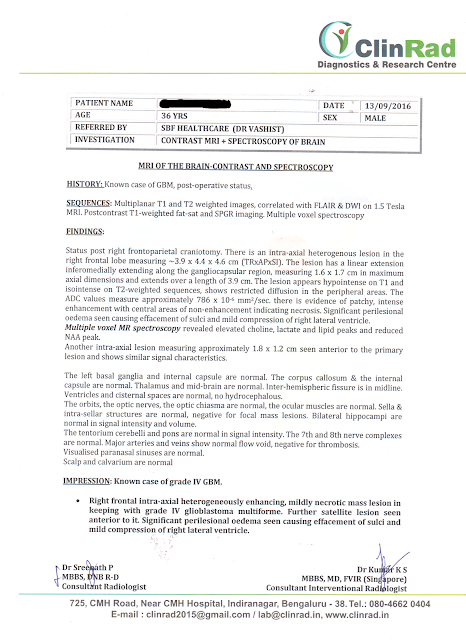All-
Thanks to everyone for contributing to this great resource. First a profile of our daughter's condition and then a question at the end.
Thanks!!!
Our 5 year old:
DOB 9/2/2011
Brooklyn, NY
9/9/2013 admission to:
Weill-Cornell Medical Center
Right neck abscess lanced and drained
March 18th, 2016 admission to:
Weill-Cornell Medical Center
Mass discovered in head after experiencing headaches for a few weeks
Left occipital/parietal brain tumor
Operated 3/19/2016
"Full Gross Resection"
Pathology determines Glioblastoma Multiforme "methylated"
Transferred to Memorial Sloan Kettering
Photon Radiation treatment for 33 days (Dr. Suzanne Wolden)
Temozolomide chemotherapy for 43 days
MRI on 7/8/2016 'clear'
'Maintenance' regime of temozolomide prescribed for 12 cycles (5 days chemo/23 days off)
Currently in 5th? cycle
Genetic sequencing/testing
• Cornell _ Precision Medicine
• MSK _ Methylation array
• MSK _ Impact Testing
• Caris Test
Other Diagnosis via 3rd party (non-MSK) bloodwork
• Positive (via Plasma test) for CMV antibodies
• Positive (via DNA test) for Herpes-6 active case
Other Treatments
• Cannibas oils (THC/THCa/CBD)
• Chinese Herbs (prescription pending)
• Supplements- Vitamin B, C, D, L-Lysine, Curcumin, sodium selenite, paw paw, cayenne pepper w/garlic, green tea extract, etc.
• Ketogenic diet since appx. June 2016
We are so grateful that our daughter is NED to-date but are considering engaging in an off-label customized peptide vaccine treatment coming out of Tubingen Germany via CeGaT. Has anyone in this community had any experiences with this?
Treatment description from their literature:
Our personalized peptide vaccination approach aims to train the immune system to recognize
specific “non-self” antigens (neoantigens) which are predicted to be specifically presented by the
patient’s tumor cells. In order to identify tumor-specific mutations, the patient’s tumor and normal
tissue sample (mostly blood) are analyzed using the modern next-generation sequencing technology.
Many of the identified tumor-specific mutations lead to alterations in proteins. Bioinformatic
prediction algorithms are subsequently applied to select those mutated peptides which are most
probably presented on the surface of the tumor cells by the patient-specific HLA molecules and
which have the potential to elicit a strong immune response. These selected peptides are synthesized
and injected as a vaccine in order to stimulate the immune system and to enhance the propagation
and activation of immune cells that specifically attack tumor cells presenting the mutated peptides.
In order to further boost the vaccine specific immune response, an immune stimulatory adjuvant (Leukine) is
co-applied at the injection site.
While they have had good results to-date they have not treated any children. This obviously concerns us. Does anyone have any experience with peptide vaccines in children? The doctors say that theoretically there shouldn't be any difference beyond dosage/body mass. What are people's thoughts on:
1) The logic of this treatment approach
2) Experiences?
3) Peptides in children
4) Experiences with FDA
Personal Use Exemption program / importing off-label drugs from overseas
Again, thanks to everyone for help!
Winston
Brooklyn, NY





